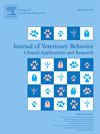Pet parenting: A systematic review of its characteristics and effects on companion dogs
IF 1.3
3区 农林科学
Q4 BEHAVIORAL SCIENCES
Journal of Veterinary Behavior-clinical Applications and Research
Pub Date : 2024-11-01
DOI:10.1016/j.jveb.2024.09.003
引用次数: 0
Abstract
Pet parenting is part of the pet-guardian relationship and involves caring for companion animals by applying strategies typically seen in the parent-child caregiving system. This phenomenon reflects a shift in the perception of companion animals, particularly dogs. We conducted a systematic review to provide an overview of these patterns of dog-directed parenting. Fifteen articles on pet parenting involving companion dogs were analyzed. The results were thematically grouped into three sections. The use of parent-child terms related to companion animals and guardians (first section) showed that familiar terms (e.g., father) are widely used within pet parenting and that factors such as familiarity with the conversational partner, culture, and the existence of children affect their usage. The influence of offspring, culture, and gender on pet parenting (second section) included studies indicating that having children was negatively associated with attachment intensity and resource investment. We also described research pointing to common factors and disparities in cultures experiencing this phenomenon. The pet parenting styles (third section) discussed studies that identified traditional parenting styles and dimensions within the dog-guardian relationships (i.e., authoritative, authoritarian, and permissive), characterized by guardians’ level of demand and responsiveness toward their dogs. Moreover, we described findings regarding the impact of pet parenting styles and dimensions on dog’s health, attachment, sociability, and problem-solving behaviors. Results of this review are discussed to comprehensively characterize the pet parenting phenomenon in relation to dogs; overall, they emphasize the relevance of adopting authoritative strategies to parent, educate, and train dogs, which directly impact on dog’s well-being.
宠物养育:宠物养育的特点及其对伴侣犬影响的系统回顾
宠物养育是宠物监护关系的一部分,涉及到通过应用通常在亲子照料系统中出现的策略来照料伴侣动物。这种现象反映了人们对伴侣动物,尤其是狗的看法的转变。我们进行了一项系统性综述,概述了这些以狗为主导的养育模式。我们对 15 篇涉及伴侣犬的宠物养育文章进行了分析。研究结果按主题分为三个部分。与伴侣动物和监护人相关的亲子用语的使用(第一部分)表明,熟悉的用语(如父亲)在宠物养育中被广泛使用,而与对话伙伴的熟悉程度、文化和是否有子女等因素会影响这些用语的使用。后代、文化和性别对宠物养育的影响(第二部分)包括一些研究表明,有无子女与依恋强度和资源投资呈负相关。我们还介绍了一些研究,这些研究指出了出现这种现象的文化中的共同因素和差异。宠物养育方式(第三部分)讨论了一些研究,这些研究确定了狗与监护人关系中的传统养育方式和维度(即权威型、专制型和放任型),其特点是监护人对狗的要求和响应程度。此外,我们还描述了宠物养育方式和维度对狗的健康、依恋、社交能力和解决问题行为的影响。本综述的讨论结果全面描述了与狗有关的宠物养育现象;总体而言,这些结果强调了采用权威性策略养育、教育和训练狗的相关性,这直接影响到狗的福祉。
本文章由计算机程序翻译,如有差异,请以英文原文为准。
求助全文
约1分钟内获得全文
求助全文
来源期刊
CiteScore
3.50
自引率
16.70%
发文量
107
审稿时长
325 days
期刊介绍:
Journal of Veterinary Behavior: Clinical Applications and Research is an international journal that focuses on all aspects of veterinary behavioral medicine, with a particular emphasis on clinical applications and research. Articles cover such topics as basic research involving normal signaling or social behaviors, welfare and/or housing issues, molecular or quantitative genetics, and applied behavioral issues (eg, working dogs) that may have implications for clinical interest or assessment.
JVEB is the official journal of the Australian Veterinary Behaviour Interest Group, the British Veterinary Behaviour Association, Gesellschaft fr Tierverhaltensmedizin und Therapie, the International Working Dog Breeding Association, the Pet Professional Guild, the Association Veterinaire Suisse pour la Medecine Comportementale, and The American Veterinary Society of Animal Behavior.

 求助内容:
求助内容: 应助结果提醒方式:
应助结果提醒方式:


